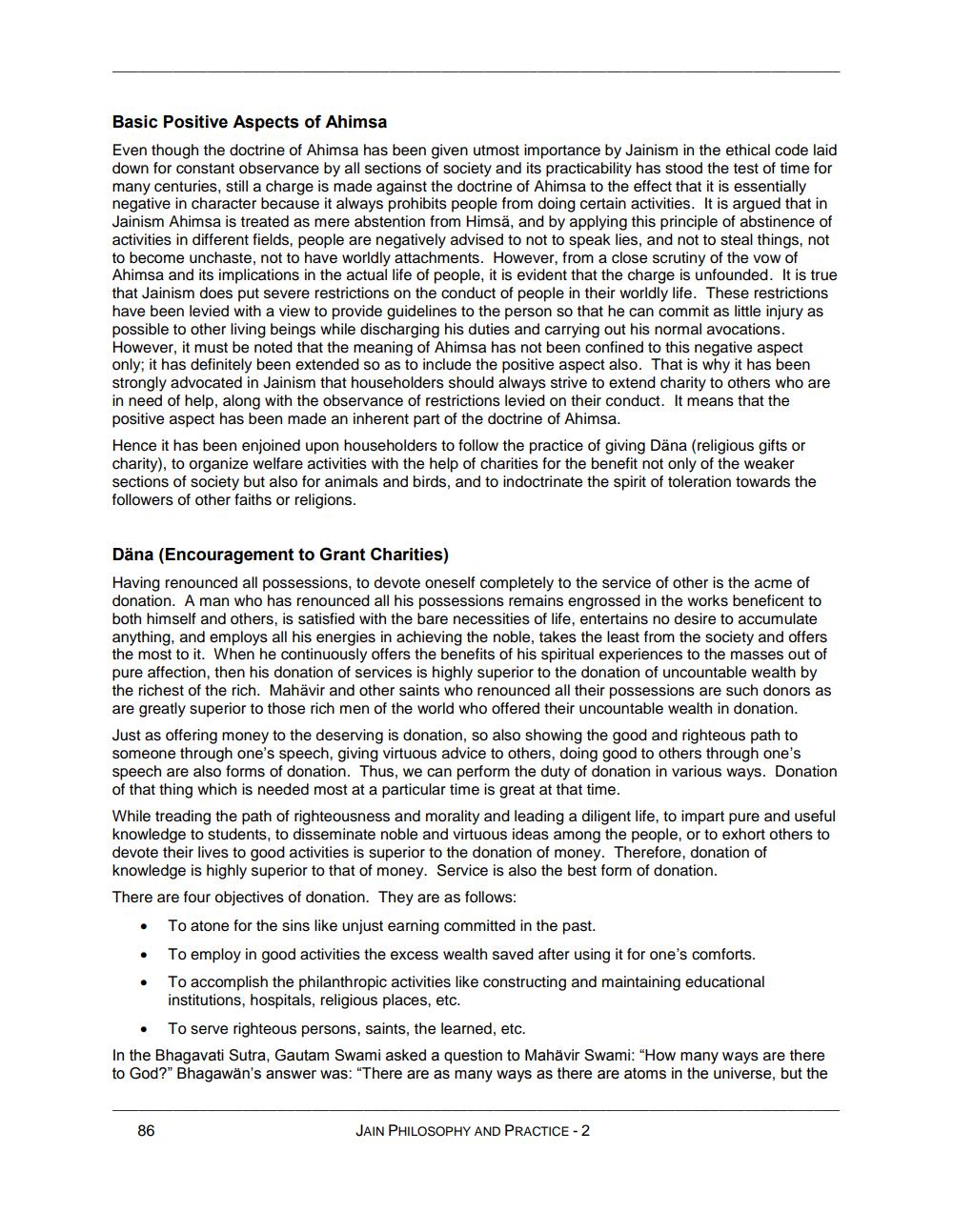________________
Basic Positive Aspects of Ahimsa Even though the doctrine of Ahimsa has been given utmost importance by Jainism in the ethical code laid down for constant observance by all sections of society and its practicability has stood the test of time for many centuries, still a charge is made against the doctrine of Ahimsa to the effect that it is essentially negative in character because it always prohibits people from doing certain activities. It is argued that in Jainism Ahimsa is treated as mere abstention from Himsä, and by applying this principle of abstinence of activities in different fields, people are negatively advised to not to speak lies, and not to steal things, not to become unchaste, not to have worldly attachments. However, from a close scrutiny of the vow of Ahimsa and its implications in the actual life of people, it is evident that the charge is unfounded. It is true that Jainism does put severe restrictions on the conduct of people in their worldly life. These restrictions have been levied with a view to provide guidelines to the person so that he can commit as little injury as possible to other living beings while discharging his duties and carrying out his normal avocations. However, it must be noted that the meaning of Ahimsa has not been confined to this negative aspect only; it has definitely been extended so as to include the positive aspect also. That is why it has been strongly advocated in Jainism that householders should always strive to extend charity to others who are in need of help, along with the observance of restrictions levied on their conduct. It means that the positive aspect has been made an inherent part of the doctrine of Ahimsa. Hence it has been enjoined upon householders to follow the practice of giving Däna (religious gifts or charity), to organize welfare activities with the help of charities for the benefit not only of the weaker sections of society but also for animals and birds, and to indoctrinate the spirit of toleration towards the followers of other faiths or religions.
Däna (Encouragement to Grant Charities) Having renounced all possessions, to devote oneself completely to the service of other is the acme of donation. A man who has renounced all his possessions remains engrossed in the works beneficent to both himself and others, is satisfied with the bare necessities of life, entertains no desire to accumulate anything, and employs all his energies in achieving the noble, takes the least from the society and offers the most to it. When he continuously offers the benefits of his spiritual experiences to the masses out of pure affection, then his donation of services is highly superior to the donation of uncountable wealth by the richest of the rich. Mahävir and other saints who renounced all their possessions are such donors as are greatly superior to those rich men of the world who offered their uncountable wealth in donation. Just as offering money to the deserving is donation, so also showing the good and righteous path to someone through one's speech, giving virtuous advice to others, doing good to others through one's speech are also forms of donation. Thus, we can perform the duty of donation in various ways. Donation of that thing which is needed most at a particular time is great at that time. While treading the path of righteousness and morality and leading a diligent life, to impart pure and useful knowledge to students, to disseminate noble and virtuous ideas among the people, or to exhort others to devote their lives to good activities is superior to the donation of money. Therefore, donation of knowledge is highly superior to that of money. Service is also the best form of donation. There are four objectives of donation. They are as follows:
• To atone for the sins like unjust earning committed in the past. • To employ in good activities the excess wealth saved after using it for one's comforts. • To accomplish the philanthropic activities like constructing and maintaining educational
institutions, hospitals, religious places, etc.
To serve righteous persons, saints, the learned, etc. In the Bhagavati Sutra, Gautam Swami asked a question to Mahävir Swami: "How many ways are there to God?" Bhagawan's answer was: "There are as many ways as there are atoms in the universe, but the
86
JAIN PHILOSOPHY AND PRACTICE - 2




